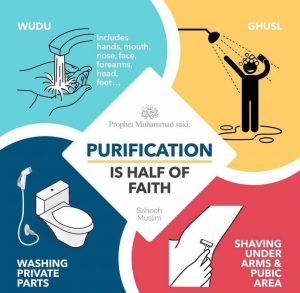UNDERSTANDING TAHARAH: PHYSICAL AND SPIRITUAL PURITY IN ISLAM

Did you know that taharah—the state of ritual purity in Islam—not only cleanses the body but also purifies the soul? This foundational element of Islamic practice serves as a bridge between physical cleanliness and spiritual elevation.
For millions of Muslims around the world, the rituals of taharah are a source of personal discipline, spiritual fulfillment, and divine connection.
In this article, we delve into the deep significance of taharah, its types, and the Quranic guidance on achieving it—whether through ablution (wudu), ritual bathing (ghusl), or dry ablution (tayammum). Join us in exploring this essential concept and how it can transform both your worship and your daily life.
What Is Taharah?
The term taharah (طَهَارَة) stems from the Arabic root word ṭa-ha-ra (طَهُرَ), meaning “to purify” or “to cleanse.” Broadly, it refers to cleanliness in both physical and spiritual dimensions. In Islamic jurisprudence, taharah is the removal of physical impurity (najasa) and ritual impurity (hadas).
One of the earliest commands given to the Prophet Muhammad (peace be upon him) following the second revelation was:
“And purify your garments.”
[Surah Al-Muddathir: 4]
In a broader Shariah context, taharah extends beyond the physical to include abstaining from sins and spiritual filth. This includes major forms of spiritual corruption such as disbelief (kufr), associating partners with Allah (shirk), and willful disobedience. As the Quran states:
“Indeed, Allah desires to remove all impurity from you, O people of the Prophet’s house, and to purify you thoroughly.”
[Surah Al-Ahzab: 33]
The Significance of Taharah
The importance of purification in Islam cannot be overstated. The Prophet Muhammad (peace be upon him) described purification as “half of faith.” As narrated in Sahih Muslim:
“Purification is half of faith.”
[Sahih Muslim, Hadith 223]
Scholars explain this hadith by noting that while faith (iman) wipes out both major and minor sins, purification primarily removes minor sins. Thus, purification is regarded as half of faith due to its immense spiritual value and its role in preparing a believer for acts of worship.
Types of Taharah in Islam
Taharah is broadly categorized into two forms:
1.Inner Purity (Spiritual)
2.Outer Purity (Physical)
1. Inner Purity: Spiritual Taharah
Spiritual purification involves cleansing the heart and soul from internal vices and spiritual maladies. This includes:
•Major spiritual purification: Removing shirk, disbelief, and innovations (bid’ah).
•Minor spiritual purification: Ridding the heart of jealousy, hatred, arrogance, hypocrisy, and love of worldly pleasures.
Spiritual purity is cultivated through sincerity, repentance, remembrance of Allah (dhikr), and the pursuit of tasawwuf (Islamic spirituality or self-purification).
2. Outer Purity: Physical Taharah
Physical purification focuses on maintaining bodily and environmental cleanliness and is classified into two main areas:
i. Najasah-Based Purification
This involves removing physical impurities (najasat) from the body, clothes, or environment. Examples include:
•Human waste (urine, feces, semen, menstrual and post-natal blood)
•Saliva, urine, or feces of non-permissible animals
•Blood of animals
•Flesh or skin of dead animals
•Alcohol and intoxicants
•Pork and its byproducts
Washing with clean water is the primary method of purification. The impurity is considered removed when no trace—neither color, smell, nor residue—remains.
ii. Hadath-Based Purification
This relates to ritual impurity that prevents a person from performing acts of worship and requires specific actions to restore purity. It is divided into:
•Minor Impurity (Hadath Asghar): Requires wudu. Caused by things like urination, defecation, or passing wind.
•Major Impurity (Hadath Akbar): Requires ghusl. Caused by sexual activity, ejaculation, menstruation, or postpartum bleeding.
If water is unavailable or harmful to use, the Shariah permits tayammum—a symbolic purification using clean earth.
Sources of Purification in Islam
1. Pure Water
Water is the default and most ideal medium for purification. It is used for both wudu and ghusl. The Quran states:
“And He sent down upon you from the sky rain by which to purify you…”
[Surah Al-Anfal: 11]
2. Clean Earth (Tayammum)
When water is unavailable, tayammum serves as a substitute:
“And if you find no water, then perform tayammum with clean earth and wipe over your faces and hands.”
[Surah Al-Ma’idah: 6]
Conclusion
Taharah stands as one of the most vital elements of Islamic faith, embodying both physical hygiene and spiritual sanctity. Through regular practice of purification, Muslims prepare themselves for prayer, increase mindfulness, and draw closer to Allah.
Incorporating taharah into daily life promotes discipline, dignity, and devotion. By striving for both inner and outer purity, we align ourselves with the core teachings of Islam, enhancing not just our worship, but our entire way of life.

